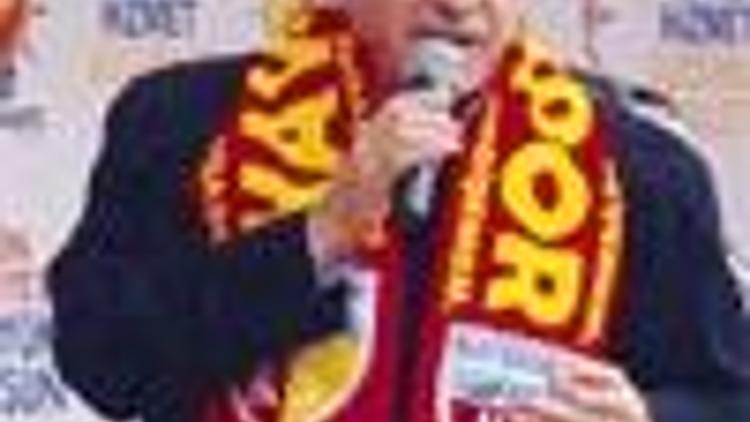Press reacts to attempts at print media censorship
Güncelleme Tarihi:

ISTANBUL - The Turkish press has been vocal, or in one case, silent, over the weekend in declaring its loyalties to freedom of expression in the latest round of conflict between the government and the fourth estate.
Turkey’s printed voices reached a crescendo yesterday as a new national daily, Haber Türk, launched its first issue from the ashes of media assets seized by the government; venerable Cumhuriyet printed a nearly blank front page in protest of pressure on the press; and the feisty Taraf carried a front-page defense by the prime minister, saying that freedom of the press is alive and well in Turkey.
Meanwhile, daily Hürriyet, the flagship of the besieged Doğan Media Group, or DMG, set aside a full page to explore how Adolf Hitler’s dictatorship began with the shuttering of the liberal Vossiche Zeitung newspaper in 1933. Hürriyet is part of the DMG and the parent company of the Hürriyet Daily News & Economic Review.
"If we are silent, who will speak?" daily Cumhuriyet asked yesterday. The question, posed in a column next to the empty front-page space, recalled the pressure the Democrat Party, or DP, government put on media outlets during the 1950s, which later brought about military intervention. As one of the oldest continuously printed dailies in Turkey, Cumhuriyet is known for its sensitivity towards secularism and republican values.
"[The ruling Justice and Development Party, or] AKP, through the prime minister and state’s instruments, first started a fight against Cumhuriyet and those who support free media and freedom of information," yesterday’s column read, adding that its warning was necessary not only for the sake of the newspaper, but for Turkey’s very existence.
Haber Türk is owned by Ciner Media Holding, whose previous media assets, including broadcaster ATV and the daily Sabah newspaper, were seized by the state and later purchased in a single budder-auction by pro-government Çalık Holding.
Berat Albayrak, the son-in-law of Prime Minister Recep Tayyip Erdoğan, was the general manager of Çalık Holding at the time of the purchase. In his first column yesterday, Fatih Altaylı, editor-in-chief of Haber Türk, wrote, "We will continue where we left off." Altaylı resigned as editor-in chief of daily Sabah when the Savings Deposit Insurance Fund, or TMSF, seized the paper in April 2007.
"Today is like April 2, 2007, for me. On April 2, 2007, our newspaper was seized and we had a break in our long media journey," Altaylı wrote in his column yesterday, adding that the new newspaper would work for a more free Turkey. "This newspaper will not be at anyone’s side or against any idea," he said.
The prime minister began calling for a boycott of the Doğan Group publications last September, after the company ran a story on German authorities prosecuting, and then convicting, three men involved with the Turkish charity Deniz Feneri, or "Lighthouse." Erdoğan started to ask AKP members and supporters not to buy Doğan’s newspapers, saying: "I tell you to start your own campaign and not to let the media outlets that give false information and lies into your houses."
The $500-million tax fine imposed on Doğan Media Group last month over the sale of a Doğan television station’s shares to German publisher Axel Springer AG came after months of castigation directed at Doğan publications by Erdoğan. Many local and international media organizations, and members of opposition parties in Turkey, have called the fine a threat to the freedom of one of the biggest press organs in Turkey.
In its article about Vossiche Zeitung on Sunday, daily Hürriyet described the ill-fated newspaper as "Germany’s Hürriyet" of its day. Soner Yalçın, a Hürriyet columnist, said the liberal German newspaper featured writers with a wide range of opinions and was owned by the liberal Ullstein family. When Adolf Hitler came to power in 1933, one of the first things he did was to shut down Vossiche Zeitung, which had been in the news business for 230 years. Daily Hürriyet said this was one of the things that allowed facism to creep into German politics.
Daily Hürriyet made another analogy to the Nazi era, calling Kurt Tucholsky, a German-Jewish writer who met an unfortunate end, "Germany’s Bekri Coşkun." Hürriyet columnist Coşkun is a fierce critic of the AKP, who is well known for using his wit to critique politicians. Erdoğan has used Coşkun’s love for dogs in his attacks against the columnist, recently describing him as one of the "men who sleep with their dogs." Tucholsky, a journalist who described himself as democrat, anti-militarist and pacifist, criticized rich people who supported Hitler’s rise to power. Prime Minister Erdoğan now says he never called for a boycott of Doğan media outlets. In a front-page piece by daily Taraf, he said he would bring the Doğan Holding matter up at his upcoming meeting with U.S. Secretary of State Hillary Clinton.
"I will ask Hillary Clinton what the U.S. Treasury Department does when faced with this kind of tax evasion," he said. The Taraf reporter who was following the prime minister on the campaign trail said Erdoğan was holding exclusive interviews only with the Turkish representatives of foreign-press organs, and that the denial of any effort to call a boycott of Doğan came at one of these meetings. The Taraf reporter, Amberin Zaman, suggested the prime minister was trying to repair his tarnished image.

